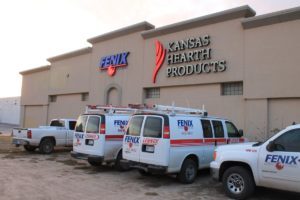Choosing between gas and electric heat can feel confusing for Wichita homeowners. Both options keep your home warm, but they differ in cost, efficiency, and maintenance. Picking the right system depends on how you use energy, your home’s layout, and Kansas’s weather patterns.
For over 30 years, Fenix Heating & Cooling has helped families across Wichita find the most practical heating solution for their homes. Their goal isn’t to sell one system over another, it’s to help you make a clear, confident decision based on real data and everyday comfort.

In this guide, you’ll learn how gas and electric heat work, what each costs to run, the pros and cons of both systems, and how to decide which one makes the most sense for your home.
Understanding the Basics: Gas Heat vs. Electric Heat
How Gas Heating Works
A gas furnace burns natural gas to create heat, which then travels through ducts to warm your home. This method delivers quick, steady warmth during Wichita’s cold nights. Most gas furnaces run between 80% and 98% AFUE, meaning most of the fuel becomes usable heat, with only a small amount lost through exhaust.
How Electric Heating Works
Electric systems use heating elements or heat pumps to warm indoor air. Electric furnaces convert electricity directly into heat with 100% efficiency, while heat pumps pull heat from the outdoor air and transfer it inside. The main difference lies in cost, electricity is pricier per unit than natural gas in Kansas, so operating costs can add up faster even though the system wastes no energy.
Weather and Energy Costs
Winters in Wichita bring cold nights and mild afternoons, so homeowners need a system that adjusts easily to changing temperatures. Gas heating often works better for this climate because it provides strong, consistent warmth when temperatures drop.
In Kansas, natural gas costs about $1.20 per therm, while electricity averages around 13 cents per kWh. That gap makes gas heat more affordable for frequent use. Before recommending any system, Fenix Heating & Cooling reviews each home’s setup, insulation, and utility costs to help homeowners choose the most efficient and practical option.
Comparing Gas vs. Electric Heat Head to Head
Installation Cost
In Wichita, a gas furnace usually costs between $3,500 and $7,500 to install, depending on your home’s size, ductwork, and gas line access. Electric furnaces cost a bit less, averaging $2,500 to $5,500, since they don’t need a gas connection.
Fenix Heating & Cooling provides clear, upfront quotes and flexible financing options, helping homeowners choose the right system without surprises.

Operating Cost and Efficiency
For a typical 2,000-square-foot Wichita home:
- Gas heat: about $500–$700 per year
- Electric heat: around $1,200–$2,500 per year, depending on insulation and rates
Gas furnaces use AFUE (Annual Fuel Utilization Efficiency) ratings and can reach up to 98% efficiency. Electric systems use COP or HSPF, converting nearly all electricity into heat but often costing more per unit of energy.
Fenix technicians recommend routine maintenance to keep both systems running efficiently and prevent costly breakdowns over time.
Heating Performance
Gas furnaces heat faster and maintain warmth even in sub-freezing weather, making them ideal for Wichita’s colder nights. Electric systems, especially heat pumps, perform best in mild winter temperatures or as part of a dual-fuel setup that automatically switches between gas and electric for optimal comfort.
Maintenance and Lifespan
Gas systems require regular care, including vent cleaning, ignition checks, and safety inspections.
Electric systems are simpler to maintain but may need occasional part replacements, like heating elements or blower motors.
With the Fenix Protection Plan, homeowners receive scheduled tune-ups that extend the life of their system and help avoid sudden repair costs.
Safety and Environmental Impact
Gas furnaces can produce carbon monoxide (CO), which is why proper ventilation and CO detector checks are essential. Electric systems generate no on-site emissions, but their overall footprint depends on how electricity is produced in the region.
Every system installed by Fenix Heating & Cooling is handled by licensed and insured professionals who perform complete safety checks, ensuring Wichita families stay warm and protected through every season.
Pros and Cons
Gas Heating
Pros:
- Heats quickly. Gas furnaces deliver warm air faster than electric systems, ideal for Wichita’s cold nights.
- Lower energy cost. Natural gas prices in Kansas make gas heating more affordable for frequent winter use.
- Reliable performance. Works well even in freezing temperatures and can still operate during power outages.
- Fits existing homes. Many Wichita houses already have gas lines, making installation easier.
- Adds resale value. Homes with gas heating often appeal to buyers in colder climates.
Cons:
- Needs a gas line and venting. Installation can cost more if gas infrastructure isn’t already in place.
- Higher carbon emissions. Burning gas releases CO₂, making it less eco-friendly.
- Requires maintenance. Vents, burners, and ignition systems need regular service for safety and efficiency.
- Safety risks. Gas leaks and carbon monoxide exposure are possible without proper detectors and professional servicing.
- Shorter lifespan. Gas systems generally last 15–20 years, which is less than most electric systems.
Electric Heating
Pros:
- Cleaner and safer. Electric systems produce no on-site emissions and carry no risk of gas leaks or CO poisoning.
- Easy installation. Ideal for homes without gas lines and less complex to set up.
- Low maintenance. Fewer moving parts mean fewer service needs and lower upkeep costs.
- Eco-friendly options. Can run on renewable electricity, reducing environmental impact.
- Longer lifespan. Electric systems can last 20–30 years with proper maintenance.
Cons:
- Higher running cost. Electricity is pricier than gas in Kansas, leading to higher monthly bills.
- Slower heating. Takes longer to warm up and can struggle in extreme cold.
- Dependent on the grid. Won’t operate during power outages.
- Less efficient in deep freezes. Performs best in mild conditions or when paired with a gas backup system.
Fenix Heating & Cooling helps Wichita homeowners weigh these pros and cons based on their home setup, energy use, and comfort needs. They provide honest guidance so every customer chooses the most practical and cost-effective heating solution.

Hybrid and Alternative Options for Wichita Homes
What Is a Dual Fuel System?
A dual fuel system combines a gas furnace and an electric heat pump to provide flexible, efficient heating year-round. The heat pump handles mild weather by transferring heat from the air, while the gas furnace automatically activates during colder temperatures when efficiency drops.
This setup allows the system to switch between gas and electric heat based on outdoor conditions, ensuring consistent comfort while keeping energy costs low. It’s a smart option for Wichita’s climate, where winters can be unpredictable but rarely stay freezing for long periods.
When a Heat Pump Makes Sense
Heat pumps are best suited for newer, energy-efficient homes with strong insulation and modern electrical systems. They provide both heating and cooling, making them a versatile choice for homeowners who value simplicity and energy savings.
Fenix Heating & Cooling installs and services both gas and electric systems, including heat pumps and hybrid configurations. Their team helps homeowners choose systems that match their home’s design, comfort needs, and long-term energy goals.
Choosing the Right System for Your Wichita Home
Key Factors to Consider
Before deciding between gas, electric, or hybrid heating, homeowners should review a few key points:
- Existing gas line: Homes already equipped with gas lines can save on installation costs.
- Electrical panel capacity: Electric systems may require an upgrade to handle increased power demand.
- Home insulation and size: Larger or drafty homes may benefit more from gas systems that heat faster.
- Budget and energy preferences: Consider upfront cost, energy efficiency, and long-term utility bills.
Recommendations

For older homes, gas furnaces often make the most sense due to existing infrastructure and lower operating costs during colder months.
For new builds or energy-efficient homes, electric or hybrid systems offer better long-term performance and can take advantage of improved insulation and renewable energy options.
Fenix Heating & Cooling provides personalized consultations for Wichita homeowners, comparing each system’s performance and cost. Their team helps you choose the right size and type of heating solution for your space, ensuring comfort without overspending.
Frequently Asked Questions
Is gas or electric heat cheaper in Kansas?
Gas heating is typically cheaper to operate in Kansas because natural gas costs less per unit of energy than electricity. For homes that use heat often during winter, gas furnaces can lower monthly bills. However, newer electric systems can still be cost-effective for smaller or well-insulated homes.
Does electric heat work well during Wichita winters?
Electric heat performs well during mild and moderate winter days but can lose efficiency when temperatures drop below freezing. Wichita’s climate often swings between both, so electric systems work best in energy-efficient homes or as part of a hybrid setup with a gas backup.
Which heating system lasts longer, gas or electric?
Electric heating systems usually last longer, about 20 to 30 years with proper care. Gas furnaces typically last 15 to 20 years due to more moving and heat-exposed parts. Regular tune-ups from Fenix Heating & Cooling can help extend the lifespan of either system.
Can I switch from gas to electric heat easily?
Switching depends on your home’s wiring and electrical panel capacity. Homes with modern wiring can convert easily, while older systems may need upgrades first. Fenix technicians can inspect your setup and explain what adjustments are required before installation.
Is electric heating safer than gas?
Electric heating is generally safer because it doesn’t burn fuel or release carbon monoxide. Gas furnaces are safe when properly maintained and ventilated. Fenix ensures every gas installation includes CO detector checks and safety inspections for peace of mind.
What’s the most energy-efficient heating option for Wichita homes?
The most efficient system depends on your home’s needs. Heat pumps work best for mild winters, while high-efficiency gas furnaces perform better in extreme cold. Hybrid systems combine both, automatically switching between gas and electric heat for maximum comfort and efficiency.
Final Thoughts

Both gas and electric heating systems have their advantages. The best choice depends on your home’s layout, insulation, and energy goals. Gas furnaces offer steady, powerful warmth during Wichita’s coldest nights, while electric and hybrid systems provide efficient, adaptable comfort for newer homes.
For more than 30 years, Fenix Heating & Cooling has been the name Wichita homeowners trust for honest advice and dependable service. Their team helps families choose heating systems that fit their lifestyle, lower energy use, and deliver comfort all year long.
Ready to find out which system suits your home best? Schedule a consultation with Fenix Heating & Cooling, your trusted local heating partner since 1988.

Trust the Fenix Comfort Heroes to rescue you from your HVAC problems. Don’t wait until the first day of winter to discover your furnace is not working! Turn it on today. If it’s not running properly, contact us and we’ll work to get your system fixed before the first frost.
Join the Fenix Protection Plan Service Program today! You’ll receive some nice benefits, like 20% off all parts and labor and having the peace of mind to know that your HVAC unit is being serviced by the best comfort specialists in Wichita!
Visit our showroom to see all our trusted products on display at 802 West 2nd St., just across from Wichita’s new library, or give us a call at 316-945-4842.
Be sure to check out our current promotions to get the best deal on meeting your comfort needs!


 Trust the Fenix Comfort Heroes to rescue you from your heating and cooling problems. Don’t wait until the first day of winter to discover your furnace is not working! Turn it on today. If it’s not running properly,
Trust the Fenix Comfort Heroes to rescue you from your heating and cooling problems. Don’t wait until the first day of winter to discover your furnace is not working! Turn it on today. If it’s not running properly, 






